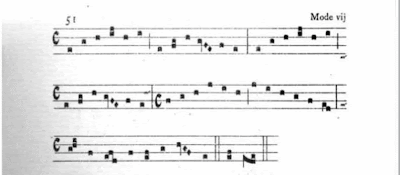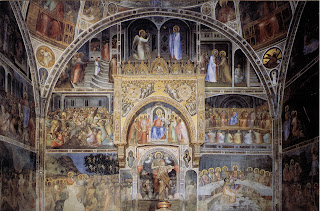That's today - and here's a Henry V soliloquy, at Poets.org, in their honor:
Henry V, Act V, Scene III [What's he that wishes so?]
by William Shakespeare
What's he that wishes so?
My cousin Westmoreland? No my fair cousin:
If we are mark'd to die, we are enow
To do our country loss; and if to live,
The fewer men, the greater share of honor.
God's will! I pray thee, wish not one man more.
By Jove, I am not covetous for gold,
Nor care I who doth feed upon my cost;
It yearns me not if men my garments wear;
Such outward things dwell not in my desires:
But if it be a sin to covet honor,
I am the most offending soul alive.
No, faith, my coz, wish not a man from England:
God's peace! I would not lose so great an honor
As one man more, methinks, would share from me
For the best hope I have. O, do not wish one more!
Rather proclaim it, Westmoreland, through my host,
That he which hath no stomach to this fight,
Let him depart; his passport shall be made
And crowns for convoy put into his purse:
We would not die in that man's company
That fears his fellowship to die with us.
This day is called the feast of Crispian:
He that outlives this day, and comes safe home
Will stand a tip-toe when the day is named,
And rouse him at the name of Crispian.
He that shall live this day, and see old age,
Will yearly on the vigil feast his neighbors,
And say 'To-morrow is Saint Crispian:'
Then will he strip his sleeve and show his scars.
And say 'These wounds I had on Crispin's day.'
Old men forget: yet all shall be forgot,
But he'll remember with advantages
What feats he did that day: then shall our names,
Familiar in his mouth as household words
Harry the king, Bedford and Exeter,
Warwick and Talbot, Salisbury and Gloucester,
Be in their flowing cups freshly remember'd.
This story shall the good man teach his son;
And Crispin Crispian shall ne'er go by,
From this day to the ending of the world,
But we in it shall be remember'd;
We few, we happy few, we band of brothers;
For he to-day that sheds his blood with me
Shall be my brother; be he ne'er so vile,
This day shall gentle his condition:
And gentlemen in England now a-bed
Shall think themselves accursed they were not here,
And hold their manhoods cheap whiles any speaks
That fought with us upon Saint Crispin's day.
Wikipedia has this to say about these not-very-well-known saints:
Saints Crispin and Crispinian are the French Christian patron saints of cobblers, tanners, and leather workers. Born to a noble Roman family in the 3rd century AD, Saints Crispin and Crispinian, twin brothers, fled persecution for their faith, ending up in Soissons, where they preached Christianity to the Gauls and made shoes by night.
Their success attracted the ire of Rictus Varus, the governor of Belgic Gaul, who had them tortured and thrown into the river with millstones round their necks. Though they survived, they were beheaded by the emperor c. 286.
An alternative account gives them as sons of a noble Romano-Briton family whose father had been killed having incurred the displeasure of the Roman emperor living at Canterbury. As they were approaching maturity their mother sent them to London to seek apprenticeship and to avoid coming to the attention of their father's killer. Travelling there, the brothers came across a shoe-maker's workshop in Faversham and decided to travel no further but to remain in Faversham where there is a plaque commemorating their association with the town. They are also commemorated in the name of the ancient pub "Crispin and Crispianus" in Strood. This account fails to explain how the brothers came to be martyred.
Saint Crispin is often associated with the Battle of Agincourt as the battle was fought on Saint Crispin's day.
Sing Sanctorum meritis, Aeterna Christi Munera, and Rex gloriose martyrum today:
From Hymn-melodies for the whole year from the Sarum service-books, "On the Feast of several Martyrs (or Confessors)":1st Ev. & M. Sanctorum meritis
At 1st Ev. ... ... ... 51
At Matt. ... ... ... . 52
At 1st Ev. & Matt. ad libitum ... ... ... 53
On Simple Feasts of the lowest class throughout the year (1 Ev. & M.)............ 54
[Matt. (York) Eterna Christi munera Et (Martyrs only) 61]
Lauds & 2nd Ev. Rex gloriose martyrum
At L. (except in Xmas & Paschal-tides) ... 25
At 2nd Ev. (& L. when no 2nd Ev.) ... 49 '
During Xmas-tide ( L. & 2nd Ev.) ... 27
On Simple Feasts of the lowest class throughout the year (L.) ... ... ... 6 or 55
So, at first Evensong (the Vespers on the eve of the feast), we could sing Sanctorum meritis, which is given at Cyberhymnal as "The Triumph of the Saints." LLPB sings it as "The Noble Deeds of Saints (MP3)." Here are the words from the former (translated by J.M. Neale), which are definitely close enough to the latter:The triumphs of the saints,
The toils they bravely bore,
The love that never faints,
Their glory evermore—
For these the Church today
Pours forth her joyous lay;
What victors wear so rich a bay?
This clinging world of ill
Them and their works abhorred;
Its withering flowers still
They spurned with one accord;
They knew them short lived all,
How soon they fade and fall,
And followed, Jesu, at Thy call.
What tongue may here declare,
Fancy or thought descry,
The joys Thou dost prepare
For these Thy saints on high?
Empurpled in the flood
Of their victorious blood,
They won the laurel from their God.
O Lord most high, we pray,
Stretch forth Thy mighty arm
To put our sins away
And shelter us from harm;
O give Thy servants peace;
From guilt and pain release;
Our praise to Thee shall never cease.
That's a nice tune; it's #51 from Hymn melodies:
Or (if we were singing Mattins in York, or wanted a different hymn to sing at Lauds or 2nd Evensong), we'd go with "The Eternal Gifts of Christ the King" (mp3), about which I've posted several times; in Latin, this hymn is Aeterna Christi Munera. I've linked to the St. David's Compline Choir version of this before; here it is again, using a different tune (MP3), and here are the Oremus words, translation J.M. Neale:The eternal gifts of Christ the King,
the apostles' glory, let us sing,
and all, with hearts of gladness, raise
due hymns of thankful love and praise.
For they the Church's princes are,
triumphant leaders in the war,
in heavenly courts a warrior band,
true lights to lighten every land.
Theirs is the steadfast faith of saints,
and hope that never yields nor faints;
and love of Christ in perfect glow
that lays the prince of this world low.
In them the Father's glory shone,
in them the will of God the Son,
in them exults the Holy Ghost,
through them rejoice the heavenly host.
To thee, Redeemer, now we cry,
that thou wouldst join to them on high
thy servants, who this grace implore,
for ever and for evermore.
Here's the chant score:
Finally, for both Lauds (Morning Prayer) and 2nd Evensong (the Vespers of the feast day itself), we'd sing Rex gloriose martyrum, to two different tunes. This is sung as "O Glorious King of Martyr Hosts (MP3)" by LLPB. The hymn is 6th Century originally; here are the English words, from Oremus:O glorious King of martyr hosts,
thou crown that each confessor boasts,
who leadest to celestial day
the saints who cast earth's joys away.
Thine ear in mercy, Savior, lend,
while unto thee our prayers ascend;
and as we count their triumphs won,
forgive the sins that we have done.
Martyrs in thee their triumphs gain,
confessors grace from thee obtain;
we sinners humbly seek to thee,
from sins offense to set us free.
All laud to God the Father be,
all praise, eternal Son, to thee;
all glory, as is ever meet,
to God the holy Paraclete.
And here is the chant score; it's #49 above:












